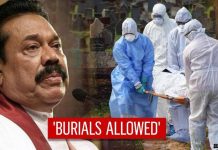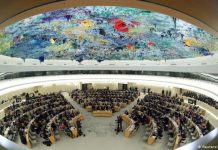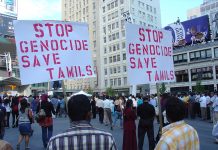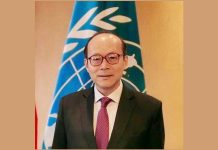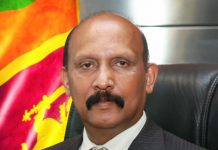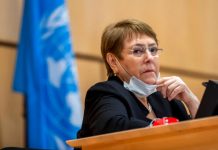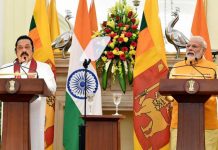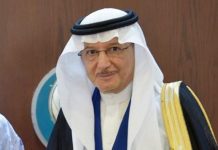Discouraging message to Global South:
Act in fair and just manner with objectivity, non-selectivity and transparency – India tells UNHRC
Ironically, when the UNHRC Chief challenged the professionalism of the Sri Lankan Judiciary and called for an international judicial mechanism, a Presidential Commission appointed by a Sri Lankan President recommended that the Attorney General consider criminal proceedings against the same President as the Commission was of the view that there is criminal liability on his part for acts or omissions and advised the AG to consider criminal proceedings against the President.
 The recommendations made by the Presidential Commission of Inquiry (PCoI) on Easter Attacks instructing the Attorney General to consider criminal proceedings against a former President, at least one former minister, the former Inspector General of Police and several others over their failure to prevent the attacks is a clear evidence of the professional strength, impartiality and transparency of the Sri Lankan Judiciary.
The recommendations made by the Presidential Commission of Inquiry (PCoI) on Easter Attacks instructing the Attorney General to consider criminal proceedings against a former President, at least one former minister, the former Inspector General of Police and several others over their failure to prevent the attacks is a clear evidence of the professional strength, impartiality and transparency of the Sri Lankan Judiciary.
Despite these glaring facts, the Office of the United Nations High Commissioner for Human Rights (OHCHR) persists with its resolutions on Sri Lanka. Replying to the charges levelled by the UNHRC, Foreign Minister Dinesh Gunawardena said on Tuesday (23), “We believe that the extent to which the resources and time of this Council has been utilized on Sri Lanka is unwarranted, and carries a discouraging message to the sovereign states of the Global South.”
The best qualified nation to represent the Global South immediately came out with similar sentiments. Indian External Affairs Subramaniam Jaishankar, addressing the virtual 46th Session of the UNHRC said that the violation of and gaps in implementation of human rights should be addressed in a fair and just manner with objectivity, non-selectivity, transparency and with due respect to the principles of non-interference in internal affairs and national sovereignty.
Jaishankar was articulating certain principles and did not refer to Sri Lanka at all, but his words had a direct relevance to the values dear to the democratic masses of this country. “India’s approach to the UNHRC is guided by a spirit of engagement, dialogue and consultation. Equal emphasis should be placed on the promotion and protection of human rights. They are best pursued via dialogue, consultation and cooperation among states and technical assistance and capacity building. Our Constitution has enshrined basic human rights as fundamental rights, guaranteeing civil and political rights, stipulating provisions for progressive realization of economic, social and cultural rights,” he said.
Last month, India presented to UN an eight-point action plan to deal with the scourge of terrorism. “We will continue to work together with members of the UNSC and other States to ensure the implementation of our action plan,” he added. He said that the human rights agenda continues to face severe challenges, most of all from terrorism. “The perennial concerns remain equally strong, be it global inequities or armed conflicts,” the External Affairs Minister said.
Incidentally, Foreign Minister Gunawardena also commenced his speech with a reference to the Liberation Tigers of Tamil Eelam (LTTE), which earned a dubious distinction as the most ruthless terrorist organization in the world. He recalled that the heroic Sri Lankan Armed Forces militarily neutralized the LTTE in 2009 after three decades of conflict. The Sri Lankan Government acted in self-defence to safeguard the Unitary State, Sovereignty and Territorial Integrity from the LTTE.
“The LTTE is the only terrorist organization in the world which has killed two world leaders: a serving President of Sri Lanka and a former Prime Minister of India extending its terror beyond the borders of Sri Lanka. The end of terrorism guaranteed the most cherished of all human rights – right to life of all Sri Lankans – Sinhala, Tamil, and Muslims,” he pointed out and lamented, “Nonetheless hegemonic forces colluded against Sri Lanka in bringing an unsubstantiated resolution against Sri Lanka which was defeated by the support of friendly nations who remain by Sri Lanka’s side even today. Further resolutions were presented to this Council on purely political motives.”
As the Indian Minister stressed, the UNHRC must address the issues in a fair and just manner with objectivity and non-selectivity. Sri Lanka’s main objection is to the UNHRC’s treatment in a highly biased, unfair and selective manner. The UNHRC has made judgements without any evidence or a trial. There are many injustices in the report. According to the twenty-first point of the Report, the appointment of Rear Admiral Sarath Weerasekera, who served in the Navy, as the Public Security Minister was wrong. It states, “The President moved the Police Department under a new Ministry of Public Security and appointed a former Navy Admiral.”
The UNHRC has ignored the fact that he was elected to Parliament in August 2020 and he got more votes than any other candidate in the Colombo District. There is no bar for a retired officer to contest elections. In the United States Congress and Senate there are many ex-Armed Forces officers.
In the US Congress, it is more than 15 percent as officially listed in the US Military Times of December 28, 2020. At one time, in 1973, it was as high as 73 percent. Last year, about one in every six members had military experience. They all served voluntarily joining the Forces as the draft (compulsory military service) had ended.
The UNHRC Report also finds fault with military officers handling the COVID-19 pandemic control measures in Sri Lanka. Para 22 of the Report says, “The Army Commander has headed the COVID-19 response, the military has been tasked with administering quarantine centres and checkpoints, and 25 senior military officers have been appointed as Chief Coordinating Officers for all districts to tackle COVID-19.”
The UNHRC has ignored the fact that every country had to deploy the military to deal with this unprecedented pandemic. The Euromil website states that the COVID-19 pandemic created new challenges, including for the Armed Forces.
Euromil has been closely monitoring the role of European Armed Forces in fighting the virus and the overall support they provided to civilian authorities and the population. In almost all countries including the USA, Armed Forces and their members provided logistical and medical support to the authorities. Among others, they were tasked with transporting medical supplies, setting up field hospitals, distributing Personal Protective Equipment (PPE) and providing medical equipment and staff. Additionally, in some countries, military personnel were requested to enforce lockdown measures or had other tasks such as disinfecting public places, conducting testing, or transporting the bodies of victims of the pandemic.
Minister Gunawardena, in his speech, said the Council is aware that this is a critical time for the entire world for the last 100 years where we need to be united in our efforts to overcome the Covid-19 pandemic and revive battered economies. “I appeal to the Members of this Council to take note of our continued engagement and cooperation on its merit and support us by rejecting any resolution against Sri Lanka. We believe that the extent to which the resources and time of this Council has been utilized on Sri Lanka is unwarranted, and carries a discouraging message to the sovereign states of the Global South.”
Sri Lanka stressed at the UNHRC that the need of the hour, in the face of an unprecedented pandemic, is solidarity rather than rancour and acrimony arising from divisions within this Council. “We urge that this resolution be rejected by the Council and be brought to closure. May I conclude quoting the words of Lord Buddha, “Siyalu sathwayo niduk wethwa, nirogee wethwa, suwapath wethwa.” May all beings be safe, May all beings be free from suffering. May all beings be well and happy.”
Sugeeswara Senadheers – Dailynews
http://www.dailynews.lk/2021/02/26/features/242551/unwarranted-treatment-sri-lanka-unhrc


